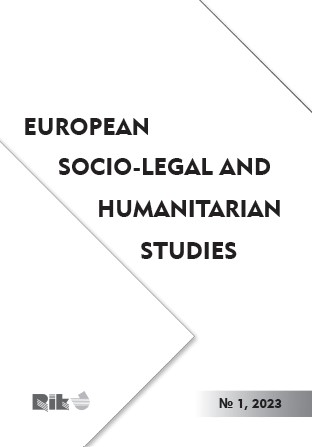HUMAN TRAFFICKING: OFFENDER’S CRIMINOLOGICAL CHARACTERISTIC ELEMENTS
HUMAN TRAFFICKING: OFFENDER’S CRIMINOLOGICAL CHARACTERISTIC ELEMENTS
Author(s): Valentyna Hrankina, Serhii BarhanSubject(s): Criminal Law, Personality Psychology, Criminology, Victimology
Published by: Editura U. T. Press
Keywords: human trafficking; crime; exploitation; criminal and legal characteristics; personality of an offender; victim;
Summary/Abstract: The purpose of the article is to highlight one of the pressing issues of modern world and Ukraine, particularly at the time of Russian Federation’s military aggression - human trafficking, and to identify criminological characteristic elements of individuals committing that criminal offense. Human trafficking in national legal acts is considered to be an illegal transaction involving a person, as well as recruitment, transportation, harboring, transferring or obtaining a person, committed with the intent to exploit, including sexual exploitation, by means of deception, fraud, blackmailing, or taking advantage of a person’s vulnerable condition or by threatening or using violence, by taking advantage of official position or financial or other kind of dependence upon another person, which, according to the Criminal Code of Ukraine, are recognized as criminal offenses. We emphasize the importance of studying the state of this issue at the national and international levels. Human trafficking in Ukraine remains a pressing issue, as 46,000 Ukrainians suffered from human trafficking in 2019–2021. In light of the migration processes triggered by Russian Federation’s armed aggression, the number of victims of human trafficking is increasing significantly, as reported not only in a number of foreign media, but also in the reports of OSCE representatives [1]. Within the first five months of the full-scale invasion of Ukraine alone, 3 million Ukrainians were forced to emigrate abroad, and 1.9 million people were displaced within the country. Such conditions made it possible to examine the factors behind the victimization of a “human commodity.” In studying problematic aspects of human trafficking phenomena, in our opinion, one of the main objects of study should be the person who committed the criminal offense (the offender). Using statistical data and court practice analysis of prosecuting persons for human trafficking, we pay significant attention to classifying offender’s personality. Following the study, author attempts to identify the main features inherent in trafficker’s personality and provides an interpretation of each acting accomplice’s personality, involved in human trafficking. We conclude that the respective criminal offense is committed by offenders who are classified as “situational”.
Journal: European Socio-Legal and Humanitarian Studies
- Issue Year: 2023
- Issue No: 1
- Page Range: 27-36
- Page Count: 10
- Language: English

